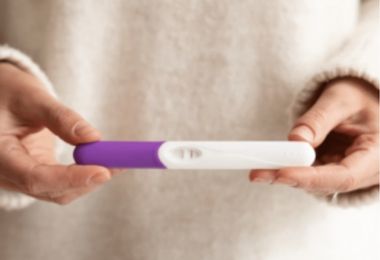
Ectopic Pregnancy Surgery
February 24, 2023
Fibroid Surgery
February 26, 2023
Ectopic Pregnancy Surgery
February 24, 2023
Fibroid Surgery
February 26, 2023
Symptoms and Causes of Infertility in Women
Infertility is a very common disease in the world. It may present itself in cases when a couple that has regular and unprotected sexual intercourse still does not have pregnancy occurring within one year. The condition of reproductive health deterioration concerns both people who enter into a relationship.

Image-1: Pregnancy test.
It is absolutely necessary to perform the necessary examinations for both sides and make an early diagnosis. Couples can have a baby by starting the necessary treatment process to restore the reproductive health of the couple. In addition to the situations in which one of the men or woman is infertile, there are also situations in which both sides are infertile. In such a case, dual therapy can be performed. The increase in individuals who want to become parents at a late age has led to the intensification of research on infertility. Signs of infertility in women are generally self-evident symptoms that require a doctor's appointment.
What Are the Causes of Infertility in Women?
The symptoms and causes of infertility in women can be more than one. These reasons should be identified in appropriate examinations and the necessary actions should be taken. In general, the causes of infertility are as follows:
- Early menopause,
- Surgical interventions,
- Cancer,
- Obesity,
- Smoking and alcohol consumption,
- Thyroid problems,
- Diabetes,
- Liver problems,
- Intra-abdominal adhesions,
- Uterine fibroids,
- Polycystic ovary,
- Having high prolactin levels,
- Endometriosis,
- Irregular menstrual cycle, lack of egg formation,
- Decreased ovarian reserve,
- Obstruction or adhesion in the fallopian tubes,
- Previous infections,
- Disorders of ovulation.
Although the causes of infertility, in general, are as above, the causes may not be fully diagnosed in some patients. In such cases, it is aimed to restore fertility by applying the most appropriate treatment to the patient. Premature ovarian failure, which is one of the most common causes of infertility, is one of the conditions that are very confused with early menopause. In the processes where infertility symptoms are observed in women, a doctor should definitely be consulted before it is too late.
What Is Premature Ovarian Insufficiency (POI)?
Premature ovarian insufficiency, which means a decline in ovarian function before the age of 40, is a common condition in women with genetic diseases. In general, the causes can be listed as cancer treatment, excessive smoking and alcohol use, and exposure to various toxins. When infertility symptoms occur in women, appropriate treatment is initiated after determining the causes. IVF treatment can be applied if necessary. Symptoms of early ovarian insufficiency include:
- Absence of menstrual bleeding or irregular,
- Fever rise and night sweats,
- Sleep problems,
- An irritable mood,
- Vaginal dryness,
- Losses in energy,
- Losses in sex drive,
- Painful sexuality problems,
- Bladder problems.
What Are the Symptoms of Infertility in Women?
The symptoms of infertility in women may not be self-evident in some cases. For this reason, first of all, it should be noted that the following symptoms will not exactly cause infertility. As mentioned above, the factors that cause infertility can be one or more. In light of the conducted research, the factors identified as the causes of infertility are as follows:
- Menstruation that follows an irregular cycle or no menstruation at all,
- Severe pain during menstrual periods, the occurrence of pains and more intense bleeding than usual,
- The condition of milk coming from the breasts despite not being pregnant,
- Excessive weight gain and hormone disorder in the direction of excessive hair growth or acne problems,
- Pregnancy does not occur in young couples for 1 year, despite the fact that they are not protected, in couples over the age of 35, pregnancy does not occur within 1 year despite the fact that they are not protected
What Are the Methods of Diagnosing Infertility in Women?
The symptoms of infertility in women are the issue that needs to be most concentrated in the diagnosis process. There is more than one method for the diagnosis of infertility. First of all, the stories of women who have infertility symptoms should be listened to in detail. In this case, understanding whether there is a genetic disorder or not is one of the biggest factors that facilitate the diagnosis process. The methods of diagnosis are usually as follows:
Blood Tests
Thanks to certain blood tests after these symptoms in women, it can be determined whether ovulation occurs within 7 days. If the menstrual cycle is regular, the process before menstruation is taken into account.
Ultrasound Tests
Egg development and ovulation controls are carried out with ultrasonography tests performed. Signs of infertility in women are extremely important in terms of ultrasonographic tests.
X-Ray
X-ray films, called HSG (uterine film), are also one of the first methods used for the diagnosis of infertility. HSG allows us to get information about the shape of the inner wall of the uterus and whether the tubes are open. If necessary, imaging of the inside of the abdomen by laparoscopy method and by using a telescopic camera for the uterus by hysteroscopy method can be performed.
What Are the Methods of Infertility Treatment?
The treatment method is determined in the process after infertility symptoms occur in women. The methods used for the treatment of infertility in women may vary depending on the cause of infertility. For this reason, in order for the best treatment to be applied, it is necessary to enter into a patient-specific process. The most important factors in determining treatment methods are usually the person's age and how long they have been trying to get pregnant, and what is the real cause of infertility in women.
IVF Treatment
One of the most preferred methods in the context of infertility treatment is in vitro fertilization treatment method. Patients are able to have a baby again with an appropriate IVF treatment process. IVF treatment is the process of fertilization of sperm taken from a man in the eggs taken from a woman by combining them together in a laboratory environment. Decontamination is a procedure.
Vaccination Method
The vaccination method, which is one of the frequently applied infertility treatments such as IVF treatment, is performed during the ovulation period when fertility is at its highest. It is performed by placing sperm prepared for vaccination into the uterus using a simple method with the help of a catheter. In general, it is applied in infertility problems where the cause is unexplained and the tubes are healthy. It is also a preferred treatment method in couples where the passage of sperm through the cervix is blocked and sexual intercourse cannot take place due to vaginismus-like reasons. One of the most frequently asked questions in the vaccination method is the state of pain and pain. Although vaccination is not a painful method, it is performed together with medications that support pregnancy and the reproductive process.
Pregnancy Medications
If the reason for the infertility condition is the lack of regular ovulation, the development of eggs can be achieved thanks to fertility drugs administered as injections or tablets. While these drugs ensure that the natural fertility mechanisms in the body work better than before, the treatment applied as an injection directly stimulates the ovaries. As a result, ovulation also occurs.
Side Effects of Pregnancy Medications
- Breast pain,
- Hot flushes condition,
- Nausea,
- Emotional fluctuations and behavioral disorders.
Situations such as multiple pregnancies may occur due to the fact that the main point of treatment with pregnancy medications is to increase the number of eggs. In addition, a condition of overstimulation of the ovaries, called ovarian hyperstimulation, may also be encountered. After a detailed analysis of the symptoms of infertility in women, it is usually possible to minimize the problems that may occur with good supervision and a well-planned treatment process. These drugs that increase the level of ovulation are drugs that are also often used in other pregnancy treatments in general.

